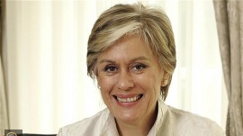REVIEW
Dame Kiri Te Kanawa, Voices New Zealand, Terence Dennis (pianist) and conductor Karen Grylls
"...a splendid recognition of one of New Zealand’s true international celebrities."
Sunday 13 March 2016

Dame Kiri Te Kanawa performs with Voices New Zealand Chamber Choir at the Michael Fowler Centre, March 13 2016, reviewed by Lindis Taylor of Middle C.
| A New Day – a choral improvisation (Voices New Zealand | |
| David Hamilton: | Un noche de Verano (Voices) |
| Jake Heggie: | Newer Every Day – Emily Dickinson poems (Kiri) |
| Fauré: | Cantique de Jean Racine (Voices) |
| Mozart: | Laudate Domium from Solemn Vespers, K 339 (Kiri and Voices) |
| Heggie: | Monologue from Masterclass (Kiri) |
| Brahms: | Four Quartets, Op 92 (Voices) |
| Schubert: | Ständchen, D 920 (Kiri and Voices) |
| Johann Strauss II – Benatzky: | Nuns’ Chorus from Casanova (Kiri and Voices) |
| Te Rangi Pai: | Hine e hine (Kiri) |
Lindis Taylor, Middle C
Michael Fowler Centre, Sunday 13 March, 6 pm
The Michael Fowler Centre was full for the Sunday early evening concert. A song recital with a few contributions from a local choir would not ordinarily have filled St Andrew’s on The Terrace; the name Kiri Te Kanawa changed everything.
Very few singers are still in business over 70 years of age (Joan Sutherland stopped in 1990, aged 64, and I suspect that even if age was starting to tell in the voice or the appearance (which really it is not) this remarkable singer would still pull them in. It’s a combination of a singularly beautiful voice, a charming and outwardly modest personality and an instinct for presenting a programme with conviction, even though on paper it looked interesting rather than compelling.
For indeed, the programme was hardly orthodox. If you expected, from one of the world’s great opera singers a handful of popular arias plus a couple of unfamiliar though worthwhile items, some well-loved choruses and ensembles from opera or oratorio, making use of the choir; then a couple of groups of German lieder and French songs by famous composers, you’d be disappointed.
But the applause, even between the short songs in a cycle, and the standing ovation at the end, probably showed that most of the audience was there for the name rather than their musical knowledge; it would have been the same whatever she sang.
On the other hand, the programme showed much thought and considerable pains had been taken with the stage presentation, especially the opening where the auditorium was plunged into darkness as choir members murmuring very quietly, crept down the aisles; secretively, they began to sing ‘a choral improvisation’ devised by conductor Grylls and the choir’s vocal coach Robert Wiremu, quoting phrases from ‘All through the Night’ and ‘Early one Morning just as the Sun was Rising’ and others. As lights rose the choir’s singing turned into David Hamilton’s a cappella setting of ‘Una noche de verano’ by Spanish poet Antonio Machado. Its haunting quality was enhanced by the sounding of a singing bowl, akin to such instruments as the glass harmonica.
The more conventional part of the concert began with a cycle of songs commissioned from composer Jake Heggie: set to poems of Kiri’s choice; she chose Emily Dickinson, and she spoke naturally about her affection for Dickinson’s poetry. (Heggie’s operas include Dead Man Walking, The End of the Affair and Moby Dick). The settings were engaging, sometimes droll, witty, touching, and Kiri’s performances with Terence Dennis’s exact reflections at the piano, caught their intimacy and disarming character, accompanied with appropriate, natural gestures. The last song, ‘Goodnight’, sort of mocking the convention of the endless reiteration in many an opera aria, very keen-eyed.
The choir sang Fauré’s much-loved Cantique de Jean Racine, in gentle, slightly uninteresting tones. Here, the absence of an orchestra mattered somewhat, even though Dennis’s accompaniment was as sensitive as possible.
The first half ended with the ‘Laudate Dominum’ from Mozart’s Solemn Vespers, for choir and soprano, a favourite that age (of neither the music nor the singer) does not dim. If the absence of opera arias (apart from the encore) was conspicuous, this wonderful sacred solo offered evidence of the still beautiful voice, smaller and less voluptuous perhaps, but still capable of touching the emotions. Her dress too gave little hint of passing years: white blouse with summery, striped skirt, perfectly suiting a singer who, from mid stalls at least, might have been approaching her fifties: she was animated, looking almost youthful.
Another of Heggie’s notable compositions began the second half: the Monologue from Terence McNally’s play, Masterclass, inspired by Maria Callas’s famous 1972 masterclasses in New York. It’s a moving little masterpiece, richly reflecting the lessons of age that might perhaps apply as well to Dame Kiri as they had to Callas. Expressed and dramatized by this evening’s diva with quiet humour and belief; one line stuck in my mind: ‘The older I get the less I know’. Like much else in the concert, a great deal resonated with the experience of aging which would have touched a lot of the audience, including your reviewer. She spoke too about the work of her foundation, which provides valued guidance and tutoring to many young New Zealand singers.
Then the choir returned to sing Four Quartets for four voices, Op 92 to Brahms. It was an opus of songs written at different times, to poems by different poets, which Brahms collected and published in 1884. The first is by Georg Friedrich Daumer, the poet of the Liebeslieder waltzes; and the others by Hermann Allmers, Hebbel and Goethe. All use imagery of the night to conjure feelings of fragility and the passing of time. The acoustic of the auditorium, perhaps dampened by the curtain behind, tended to reduce the impact of the occasional rises in the emotion expressed by the choir, which were singing with great sensibility and insight, and there was the subtle, illuminating piano accompaniment.
Schubert wrote several Ständchen (serenades). This was not the most famous one, much arranged for all manner of voices and instruments. Opus D 920, set to a poem by Grillparzer, as beautiful, if not of similar, anthologising quality, was written originally for baritone and men’s chorus; but Schubert also scored it for soprano and women’s chorus, which is how it was sung. I was a little surprised that Kiri sang this reasonably familiar piece using the score. And again, my attention was particularly caught by Terence Dennis’s sparkling and thoughtful playing the of colourful piano part.
Kiri has made something of a signature piece of the Nuns’ Chorus (‘Nun’s’ in the programme! I noticed more than one nun singing in the chorus), almost from the beginning of her career. The melody by Johann Strauss II was not from a waltz or an operetta, but written some 20 years before his venture into the theatre in 1871. It was spotted about 80 years later by Ralph Benatzky (most famous for his Im weissen Rössl – At the Whitehorse Inn) and included, along with other music by Strauss, in the pasticcio operetta, Casanova, which went down well in the Berlin of the Weimar Republic. It was given imaginative theatrical treatment, though it didn’t quite conjure the atmosphere of Viennese (or here, Berlin) operetta.
The concert ended with the predicable Hine e hine; repeated as a second encore after the first encore, the only operatic offering of the evening: ‘O mio babbino caro’ from Gianni Schicchi. And there was long applause, with most of the audience eventually standing.
I should have commented earlier on the excellence of the programme book, which sets a good example with intelligent biographies of Te Kanawa, Dennis, Grylls, as well as interesting musicological and other details about the pieces. The nature and origin of the Fauré chorus and the ‘Laudate Dominum’ were simply described; Jake Heggie’s two pieces were placed in context; the pithy note on Schubert’s Ständchen might have commented on his settings of the other songs with that name; the provenance of the Nuns’ Chorus was clearly attributed; and dates were employed usefully throughout: not a strong point among many annotators.
But you have to go elsewhere (Wikipedia the most accessible) to refresh your memory about Dame Kiri’s origin. Typically, the biography is coy about her birth: born in Gisborne, Claire Mary Teresa Rawstron, on 6 March 1944. (after all, the note on Newer every day disclosed that it had been commissioned for her 70th birthday in 2014). Why doesn’t the feminist movement insist that birth dates of female personalities are routinely published in the same way as men’s are?
In all a splendid recognition of one of New Zealand’s true international celebrities.








